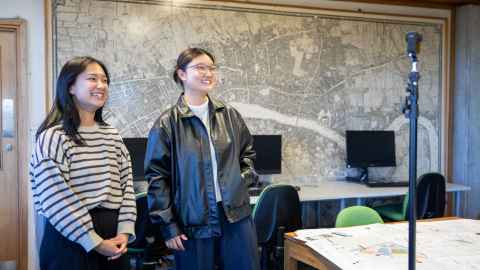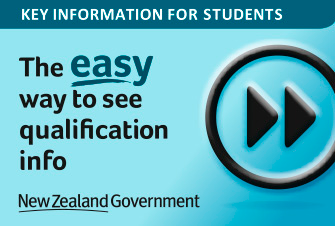Programme overview
Professional urban planners play a critical role in shaping our urban environments – economically, environmentally, socially and culturally.
The Bachelor of Urban Planning (Honours) explores how towns, cities and public spaces can impact our lives. You will use both critical analysis and creativity to address real-world issues and implications of urban development.
With a BUrbPlan(Hons), you’ll be eligible to apply for membership to the New Zealand Planning Institute.
Programme structure
In your first year, you’ll learn about the broad influences on urban planning and the structure of cities. We’ll also introduce the policy and legislation that dictate outcomes. Through studio courses, you’ll develop your creative and design capabilities and become familiar with land use principles.
In your second and third years, you'll explore sustainable urban development, Māori and Pacific planning priorities, urban design concepts, and the legal and economic aspects of urban planning. Studio courses give you the chance to apply what you’ve learned to real world cities.
Being based in Auckland, you’ll have the opportunity to apply your knowledge and interact with leading industry professionals in New Zealand’s largest urban environment.
In your final year, you’ll have the freedom to explore an urban issue of interest to you within your honours dissertation (maximum 10,000 words).
Most students need to take one General Education course.
Students should also be aware of the University’s Academic English Language Requirement.
Sample programme structure
Year One 120 points
-
- Code:
- BLTENV 101
- Name:
- People, Place and Design Studio
- Type:
- Compulsory core course
- Points:
- 15 pts
-
- Code:
- BLTENV 102
- Name:
- Environmental and Social Justice
- Type:
- Compulsory core course
- Points:
- 15 pts
-
- Code:
- BLTENV 103
- Name:
- Media for Spatial Practices
- Type:
- Compulsory core course
- Points:
- 15 pts
-
- Code:
- WTRENG 100
- Name:
- Waipapa Taumata Rau
- Type:
- Core course
- Points:
- 15 pts
-
- Code:
- URBPLAN 101
- Name:
- Introduction to Urban Planning
- Type:
- Compulsory core course
- Points:
- 15 pts
-
- Code:
- URBPLAN 124
- Name:
- Ecosystem, Sustainability and Environment
- Type:
- Compulsory core course
- Points:
- 15 pts
-
- Code:
- URBPLAN 125
- Name:
- Urban Planning Studio 1
- Type:
- Compulsory core course
- Points:
- 30 pts
Year Two 120 points
-
- Code:
- URBPLAN 205
- Name:
- Urban Infrastructure and Transportation Planning
- Type:
- Compulsory core course
- Points:
- 15 pts
-
- Code:
- URBPLAN 221
- Name:
- People, Housing and Communities
- Type:
- Compulsory core course
- Points:
- 15 pts
-
- Code:
- URBPLAN 222
- Name:
- Urban Economics
- Type:
- Compulsory core course
- Points:
- 15 pts
-
- Code:
- URBPLAN 223
- Name:
- Planning Law and Applications
- Type:
- Compulsory core course
- Points:
- 15 pts
-
- Code:
- URBPLAN 225
- Name:
- Urban Planning Studio 2
- Type:
- Compulsory core course
- Points:
- 30 pts
-
- Code:
- URBPLAN 226
- Name:
- Urban Planning Studio 3
- Type:
- Compulsory core course
- Points:
- 30 pts
Year Three 120 points
-
- Code:
- URBPLAN 307
- Name:
- Negotiation, Mediation and Project Management
- Type:
- Compulsory core course
- Points:
- 15 pts
-
- Code:
- URBPLAN 321
- Name:
- Urban Policy Analysis, Development and Research Skills
- Type:
- Compulsory core course
- Points:
- 15 pts
-
- Code:
- URBPLAN 323
- Name:
- Māori Planning
- Type:
- Compulsory core course
- Points:
- 15 pts
-
- Code:
- URBPLAN 325
- Name:
- Urban Planning Studio 4
- Type:
- Compulsory core course
- Points:
- 30 pts
-
- Code:
- URBPLAN 326
- Name:
- Urban Planning Studio 5
- Type:
- Compulsory core course
- Points:
- 30 pts
-
- Name:
- General Education
- Type:
- General Education course
- Points:
- 15 pts
Year Four 120 points
-
- Code:
- URBPLAN 711
- Name:
- Urban Planning Theory
- Type:
- Compulsory core course
- Points:
- 15 pts
-
- Code:
- URBPLAN 714
- Name:
- Urban Planning Methods and Plan Making Studio
- Type:
- Compulsory core course
- Points:
- 15 pts
-
- Code:
- URBPLAN 716
- Name:
- Contemporary Wicked Problem Studio
- Type:
- Compulsory core course
- Points:
- 30 pts
-
- Code:
- URBPLAN 734
- Name:
- Smart City Planning
- Type:
- Compulsory core course
- Points:
- 15 pts
-
- Code:
- URBPLAN 735
- Name:
- Resource Consents and Implementation, Evaluation
- Type:
- Compulsory core course
- Points:
- 15 pts
-
- Code:
- URBPLAN 757
- Name:
- Research Project
- Type:
- Compulsory core course
- Points:
- 30 pts
2025 entry requirements
My highest qualification is from:
Secondary school qualifications
If you're joining us from secondary school, here's what you need to enter the programme.
You are guaranteed entry to this programme if you meet these requirements.
- First, you must meet the University Entrance (UE) standard.
- You must also meet the rank score for this programme. Not sure about your rank score? Use our rank score calculator.
- You may need to have studied certain subjects or achieved credits in particular subjects.
- Some programmes have additional requirements, such as an interview, portfolio or references.
Guaranteed rank score, subject and other requirements
If your rank score is slightly lower than the guaranteed score, we encourage you to still apply. We will consider your application if places are available. If you don’t meet the requirements, you may be able to apply under our Undergraduate Targeted Admission Schemes.
-
QualificationNCEA National Certificate of Educational AchievementScore required180
-
QualificationCIE Cambridge International ExaminationsScore required190
-
QualificationIB International BaccalaureateScore required27
Read more about entry requirements for New Zealand secondary school applicants.
Tertiary qualifications
If you've studied at a tertiary institution, here's what you need to enter the programme.
You can transfer from another tertiary institution, or another University of Auckland qualification, if you meet these requirements.
Guaranteed grade requirements
These are the grades required for guaranteed entry to this programme. If your grades are slightly lower, we encourage you to still apply. We will consider your application if places are available.
-
Grade requiredGPA Grade Point Average 3.0
-
Grade requiredGPE Grade Point Equivalent 3.0
Other pathways to study
You could be eligible for another programme, or check out these alternative pathways:
- See if you meet the criteria for the Undergraduate Targeted Admission Scheme (UTAS).
- Bridge your educational gap with a preparation and foundation programme.
- If you are under 20, have no formal University Entrance (UE) qualification, and are a New Zealand or Australian citizen or permanent resident you can apply for discretionary entrance.
- If you can demonstrate outstanding academic achievement and maturity, we offer admission to applicants under 16.
My highest qualification is from this country or region:
Secondary school qualifications
If you're joining us from secondary school, here's what you need to enter the programme.
You need to have one of the following:
- International Baccalaureate Diploma with a minimum total score of 24.
- General Certificate of Education (GCE) Advanced Level. You must have completed a minimum of three A-Level subjects.
- Cambridge International Examinations (CIE). You must have completed a minimum of three A-level subjects.
GCE ‘A’ Level requirements apply to ‘A’ Level qualifications examined by bodies such as AQA, OCR, Edexcel, WJEC, CCEA and Pearson Education Limited taken outside of New Zealand.
Minimum grade, subject and other requirements
Minimum requirements listed here are the likely grades required and do not guarantee entry. We assess each application individually and applicants may require a higher grade to be offered a place. Your CIE/GCE A level score is calculated on the best three academic subjects and General Studies cannot be included.
-
QualificationIB International Baccalaureate DiplomaScore required31QualificationIELTS Academic International English Language Testing SystemScore required6.0
No bands less than 5.5.
-
QualificationGCE A Level/CIE General Certificate of Education Advanced LevelScore requiredBCCQualificationIELTS Academic International English Language Testing SystemScore required6.0
No bands less than 5.5.
Tertiary qualifications
If you've studied at a tertiary institution, here's what you need to enter the programme.
You can transfer from another tertiary institution if you meet these requirements.
You need to have the following:
One year successful bachelor-degree level study at a recognised university (or similar institution) overseas.
Guaranteed grade requirements
These are the grades required for guaranteed entry to this programme. If your grades are slightly lower, we encourage you to still apply. We will consider your application if places are available.
-
Grade requiredGPE Grade Point Equivalent 3.0
-
QualificationIELTS Academic International English Language Testing SystemScore required6.0
No bands less than 5.5.
Other pathways to study
You could be eligible for another programme, or check out these alternative pathways:
- Bridge your educational gap with a preparation and foundation programme.
- If you have an offer of place from us that is conditional on meeting English language requirements, you may be considered for English Pathway courses from the University of Auckland English Language Academy (ELA)
How much does a Bachelor of Urban Planning (Honours) cost per year?
2025 fees
- Domestic students
- NZ$7,857.60*
- International students
- NZ$44,972*
Fees are set in advance of each calendar year and will be updated on this website. Fees are inclusive of 15% GST, but do not include the Student Services Fee, course books, travel and health insurance, or living costs. Amounts shown are indicative only. In addition to the tuition fees, there is a Student Services Fee of $9.24 per point, estimated at $1,108.80 for full-time study (120 points). Fees will be confirmed upon completion of enrolment into courses.
*Please note: amounts shown are indicative and estimates only.
Find out about financial support information
Scholarships and awards
Find out about the scholarships you may be eligible for.
Student loans and allowances
Are you a New Zealand citizen or resident? You could be eligible for a student loan or allowance.
Cost of living
Get an idea of how much accommodation and general living in Auckland will cost.
Key dates
Application closing dates
- Semester One 2025
- 8 December 2024
Start dates
Here are the start dates for the programme.
| Semester One | Starts – 3 March |
|---|---|
| Ends – 30 June |
| Semester One | Starts – 2 March |
|---|---|
| Ends – 29 June |
Other important dates
See important dates for the academic year, including orientation, enrolment, study breaks, exams, and graduation.
How to apply
Applying for an undergraduate programme? Check out our step-by-step guide.
Where could this programme take you?
The three common avenues for employment in urban planning are local government, central government and private practice. BUrbPlan(Hons) graduates generally start out assisting in all aspects of planning, and later choose to specialise in one domain, such as transport, consents, environmental planning or design.
Jobs related to this programme
- Central, regional and local government bodies
- Community groups
- Iwi authorities
- Non-governmental organisations
- Private practice
- Urban design
Student career planning service
Once you become a student at the University, you can get help with planning and developing your career from Career Development and Employability Services.
Experience the University

Take a 360° tour with Urban Planning students
Enjoy a 360° virtual tour of some of the Urban Planning spaces on campus.
Do you need help?
Can’t find the answer in AskAuckland?
Need to speak to someone?
You can phone us directly.
- Auckland
- 923 5025
- Outside Auckland
- 0800 61 62 63
- International
- +64 9 373 7513


